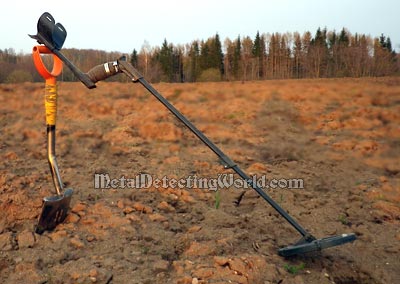PART II: Useful Tips for Metal Detecting with XP Deus, page 5
How To Recognize False Coin-Like Signals with XP Deus: GROUND FALSING
(...CONTINUED from Previous Page)
B-2) GROUND FALSING:
Ground Falsing occurs in some cases of high-mineralized ground or/and when the Sensitivity is set too high, or the Ground Rejection Level (GRL) is manually set at 87 or lower (in MANUAL mode of Ground Balance - see details on page 14 of Part I).

• With the GRL set at 87, the hot rocks (you may want to read about them here) will be detected. The Deus' audio responses to the hot rocks are high-tone loud and clear (without iron buzz) - just like the 'coin signals'; however, the hot-rock signals are easy to recognize and not to confuse with true coin signals. The Deus' responses to the hot rocks are long-continued, like being "smeared", and a shallow hot rock may sound off with a triple-beep signal that is faster than a multi-beep response to a coin lying on the ground surface.
It is NOT recommended to set the GRL higher than 87 unless you metal detect on extremely mineralized ground because you may not hear responses to the deepest coins. In magnetic ground, such coins are identified by the Deus' discriminate circuit as hot rocks because they have a similar "signature".
NOTE 1: In the Deus' firmware v3.0 and subsequent versions, by adjusting the NOTCH GROUND (see details on this page and on page 40 of the Deus v3.0 user manual), any of the GRL values between 83-90 can be "notched out" to reject false signals of the hot-rocks and sporadic mineralization formed by human activity (pottery, bricks, hearths, slag, etc.). And, at the same time, you will not reject the ground values from below 83. However, be aware that rejection of any GRL values will cause reduction of the Deus' operating depth range.
So, if no sporadic mineralization, except the hot rocks, is present at your hunt site, it is best to keep the GRL reasonably low and just ignore the hot rocks. After a few encounters with them, you will be able to distinguish an audio response to a hot rock from a true coin signal.
• With the GRL set at 85, some types of pottery and bricks as well as mineral clusters in the ground will begin sounding off with false signals. If you set the GRL lower than 85, for example, at 82, the Deus' responses to ground mineral content may intensify to the point that you will receive a few high-tone "squeaks" - weak and short signals, with every sweep of a search coil. This may cause some difficulty for you in discerning the deep-coin responses (described on next page) among the false "squeaks" because both types of signals sound alike.
NOTE 2: The above-mentioned GRL breakpoints, 87, 85 and 82, may have different values in your search area due to different characteristics of mineralization.